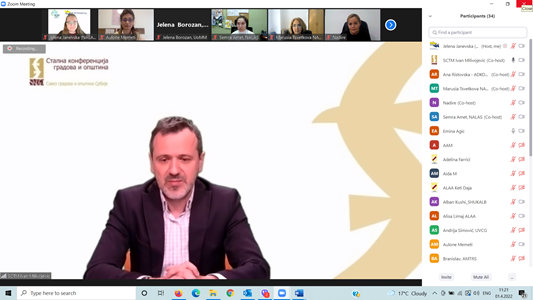
The Regional Networking Meeting: How to establish and manage an impactful training centre?, organised by NALAS within the Regional Capacity Development Network for Water and Sanitation Services (RCDN) took place on 1 April 2022.
The meeting brought together 34 participants from 17 different associations, who unselfishly shared their experiences and lessons learnt in all the steps related to establishing and running a successful training centre that meets the capacity development (CD) needs of municipalities and public utility companies.
“This meeting contributes to two of the RCDN outcomes – association development and CD product delivery. Many of the RCDN partner associations are on the beginning or have an idea to establish a training centre. RCDN has supported many of these initiatives through grants, association development program and a number of trainings and ToTs. With this meeting we offer one more opportunity to RCDN partner associations to learn from each other’s practical experiences and apply good practices”, said Ms. Jelena Janevska, RCDN Knowledge Manager in her opening speech.

Keynote presentations were provided by two NALAS member LGAs who run superb training centres: the Standing Conference of Towns and Municipalities – National Association of Local Authorities in Serbia (SCTM) and the National Association of Municipalities in the Republic of Bulgaria (NAMRB). They reflected on the history of their training centres, how they have been established and developed over time, their biggest achievements, biggest challenges, and provided peer-to-peer advices to all LGAs and APUCs that plan to run training centres.
Mr. Ivan Milivojevic, SCTM’s Deputy Secretary General for Services to Members explained how their training centre coordinated donors’ activities in the area of capacity development for local governments, how they identify municipalities’ needs and respond to them and how they adjusted services during COVID-19 pandemics. SCTM is an accredited training provider and their training centre is covering 34 training topics in 2022 and their experience was a true inspiration for all participants.

Ms. Marusya Tsvetkova, NAMRB’s Senior Expert “Institutional Projects” told the story of a training centre with huge impact over the development of Bulgarian municipalities. Namely, in 2022 the centre will organise 159 trainings, reaching out to 3975 participants. “The training activities of NAMRB are the most wanted service delivered to municipalities, based on study among local authorities”, said Ms. Tsvetkova. “NAMRB is positioned as the key beneficiary of the Bulgarian Operational Programmes for capacity development activities for municipalities, as well as key respondent of the state authorities, European and international organisations on issues related to municipal capacity. This is made possible through a “bank” of more than 300 trainers and lectors”. Ms. Tsvetkova also spoke about the support that their company, NAMRB Active Ltd. provides in the organisation of capacity development measures, as well as the training centre they run in Gabrovo, now ranked as a three-star hotel.

The first exchange session focused on the key lessons learnt from establishing a training centre, specifically related to:
- Determining the objectives of the Training Centre
- Target groups and their specific needs
- Developing the CD offer
- Staffing and trainers
- The look of the Training Centre
- Business plan
Mr. Gani Berisha, Program Manager in the Association of Kosovo Municipalities (AKM) explained how AKM, known for its exceptional advocacy role, now complements it with a set of training programmes that meet the priority needs of member municipalities.

Ms. Nadire Vitija, Manager for Training and Professional Development in SHUKOS sketched the development path of their training centre from training needs assessment, creating and establishing pool of trainers and delivery of CD measures, all with the support of RCDN.

The second exchange session focused on the key success factors in running an impactful training centre, specifically related to:
- Quality Standards
- Promoting the CD offer
- Implementing the CD offer
- Working with the pool of trainers
- Measuring the impact of the training centre
Ms. Ana Ristovska, ADKOM’s Training Centre Manager highlighted the quality standards of their training centre and how they contribute to ensure relevance of their work, transparency, accountability and replication of good practices. ADKOM’s training catalogue is the place that public utility associations consult looking for the best opportunities to strengthen their capacities.

Ms. Jonida Ahmeti, Training and Professional Development Manager of SHUKALB made a virtual tour through the development of their training centre, as of 2007. Ms. Ahmeti highlighted their key success factors, from defining the vision and the strategy up to partnership with donors and IFIs, promotion, measuring the impact, customer relations and investing in the quality of staff.

The meeting was moderated by Ms. Aulone Memeti, from AKM’s Training Centre.
Participants were encouraged to make a further use of the Practical Guide: Establishing and Running a Training Centre, that provides a step-to-step guidance.
***
RCDN aims to increase effectiveness and efficiency of the water utilities in the Western Balkans, contributing to better service provision with larger numbers of population groups getting access to drinking water and sanitation services and meeting the European Union (EU) environmental Acquis Communautaire. To achieve this, RCDN has three key components: 1) Association Development, 2) Capacity Development Offer and Delivery and 3) Partnership and enabling Capacity Development Environment.
RCDN works with LGAs and APUCs in Albania, Bosnia and Herzegovina, Kosovo, North Macedonia, Montenegro and Serbia, while the final beneficiaries are the top and middle managers from municipal and regional utility companies and officers in charge in municipalities. The project is managed by GIZ, on behalf of SECO and BMZ, and is implemented by a Project Implementation Team consisted of IAWD, Aquasan and NALAS.